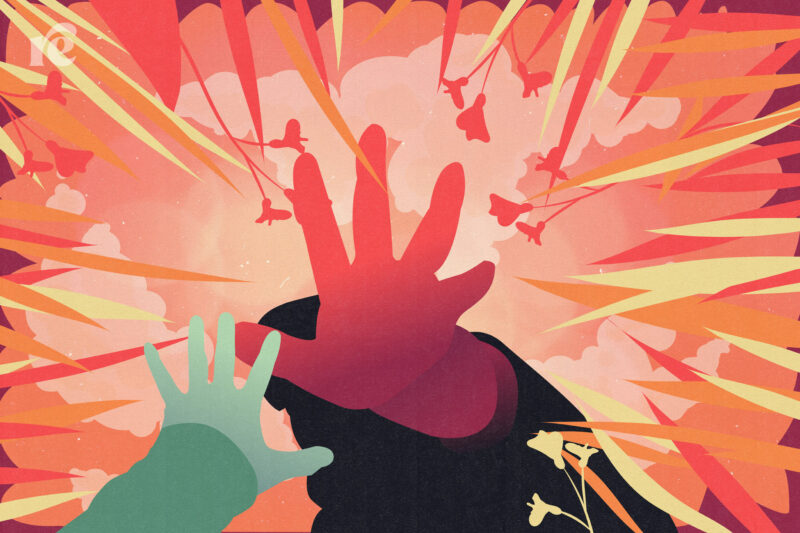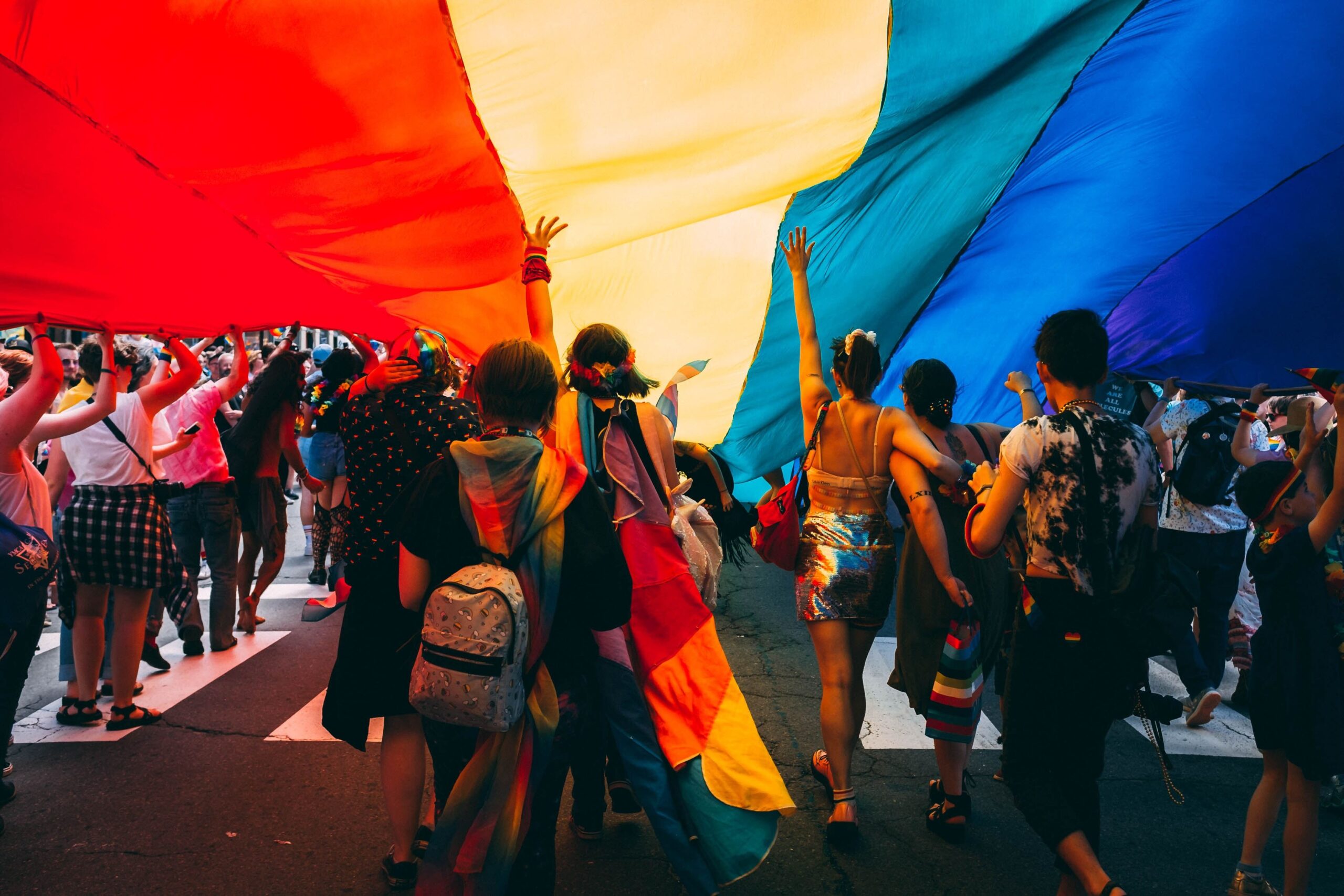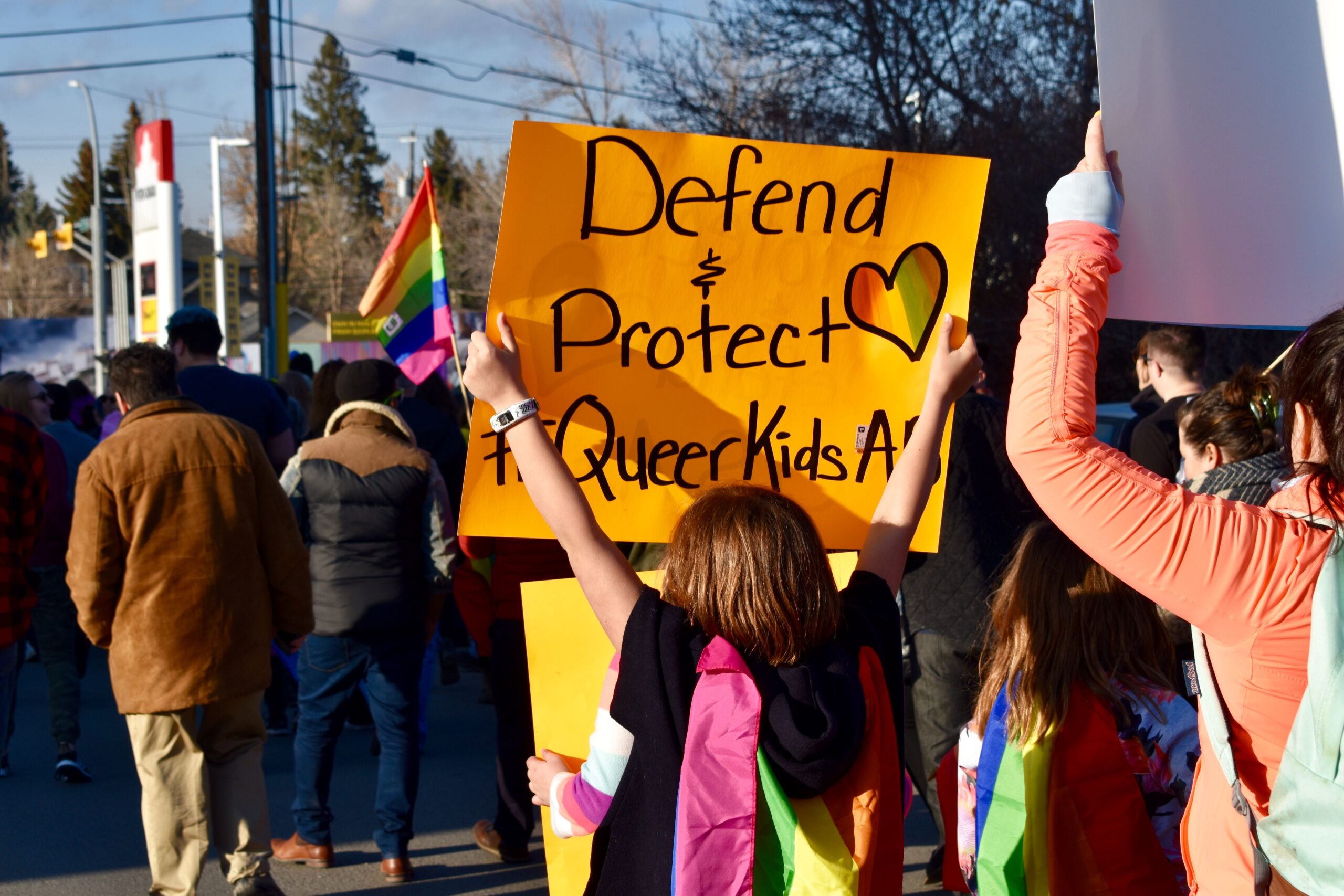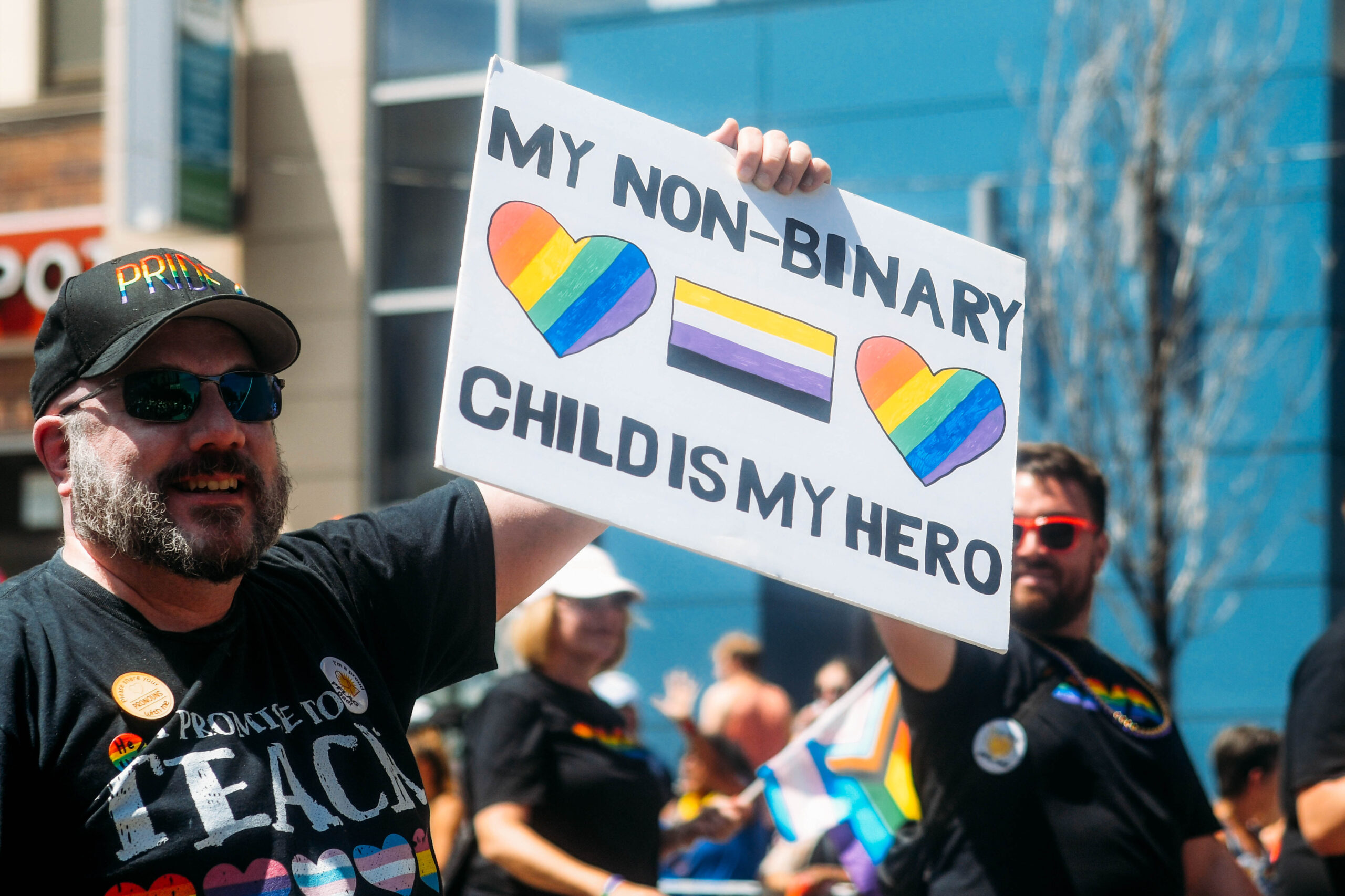How the Children of LGBTQ+ Parents Protect Each Other in the Face of Discrimination
As conservatives increasingly question queer families' right to exist, the children of LGBTQ+ people have found community—and safety—with one another.

This is part two in a series. You can read part one here.
“It’s hard to say what safety would feel like, because we’ve never got to taste it,” Adien Lyford said of their queer community. They are a queer, nonbinary student at a small-town, Midwestern university.
Lyford, in their early 20s, is the grandchild of a gay man. They grew up going to Pride; when they came out as bisexual to their mom, author Julie Lyford, in middle school, “My mom was like, ‘That’s great, what do you want for dinner tonight? Lasagna?’”
Lately, however, they feel intensifying dread. Constantly explaining their nonbinary identity is exhausting. They’re worried about the barrage of anti-trans laws.
“I can’t deny that it gets really hard sometimes,” Lyford said. At the same time, “I’m not just going to let us be hurt. I refuse. I’m going to scream at the world until it hears me.”
The adult children of LGBTQ+ parents and caretakers I spoke to expressed pride in their families and identities. But they also experienced stigma, from housing discrimination to social exclusion, that shaped their lives.
In the face of this, the children of LGBTQ+ folks build safety for themselves and their loved ones every day. Through community-building and protest, celebration and representation, LGBTQ+parented people make choices—often with scarce resources, and bearing the trauma of systemic inequalities—to care for themselves and one another beyond the cisgender and heterosexual nuclear family. In doing so, they claim space not just to survive, but to thrive.
Daily discrimination
People with LGBTQ+ parents and caretakers experience legal, social, and economic discrimination. This contributes to what social scientists call minority stress: the sustained trauma of being a marginalized person.
Society inflicts heightened minority stress on transgender and bisexual people compared to their cisgender and monosexual counterparts. Derek Siegel, a sociologist researching trans parenthood at the University of Massachusetts, Amherst, said many trans women they interviewed initially hesitated to become parents due to fears of discrimination.

Institutional racism further harms LGBTQ+ Black and Indigenous people and other people of color. They have less access to material and healing resources than their white and wealthy counterparts. The children of queer parents, particularly those of color, are more likely to live in poverty or experience economic anxiety related to discrimination.
Brittnee Gauthier is now in her early 30s, and works as a licensed marriage and family therapist in California. Her gay father was in the U.S. Air Force under “don’t ask, don’t tell,” which banned LGBTQ+ members of the military until 2011. As children, she and her sister had to keep their father’s sexual orientation hidden for fear the military would discharge him and they’d lose their housing. This contributed to a “nerve-wracking” sense of secrecy, Gauthier said.
Institutional discrimination against LGBTQ+ families often prevents them from obtaining social and medical support, particularly harming LGBTQ+ family members with disabilities. Meanwhile, in social settings, LGBTQ+ parents and their children often hide their family structures out of fear for their safety.
“One of the biggest moments that this came up for me is in childhood, when my mother was a volunteer with our Boy Scout troop,” said Kenji Kuramitsu, a Chicago-based therapist and board member of COLAGE, a national organization that supports the children of LGBTQ people. He is the bisexual son of a lesbian mother.
The Boy Scouts banned queer adults from volunteering based on false and harmful propaganda that queer and trans people are more likely to abuse children. LGBTQ+ people are no more likely to abuse others than straight and cis people, but they are more likely to be abused, due to pervasive discrimination. Kuramitsu said his parent was “livid” about the Boy Scouts’ bigotry, but she hid her identity and volunteered in order to support her son.
Experiences like this made Kuramitsu feel like he had a “divided self,” he said, referencing W.E.B. Du Bois’ concept of double consciousness.
“Inside of my house there was nothing more normal than having gay parents,” said Jesse Sgambati, a queer and trans musician in his mid-20s who grew up in New York state. Outside the house, other children bullied them for being the Black, adopted son of two white, gay men. “It was definitely hard growing up,” he said. “But it never made me ashamed. I was always vocal and proud to be the child of queer parents.”
Safety concerns shape LGBTQ+ families’ life choices, including about where to live. A recent study showed that 56 percent of LGBTQ+ families in Florida are thinking about moving out of state; 17 percent have already taken steps to do so.
Adrian Ogle, who is queer and has a queer parent, was the former board chair of COLAGE. He grew up in Florida, and he said most of his queer childhood friends have moved away.
“We will probably never go back,” Ogle, who now lives in New York, said. “It’s heartbreaking. It’s actually kind of traumatic.”
Numerous factors prevent LGBTQ+ families from moving away from oppressive legislation, including deep-rooted ties to their homes and communities.
Many families lack the economic means to move. Courts often impose mobility restrictions on LGBTQ+ folks who have been incarcerated. LGBTQ+ immigrants, particularly those who are undocumented, face hurdles based on citizenship status, said Nadine Nakamura, a psychology professor and LGBTQ+ immigration expert at Alliant International University. Meanwhile, colonialism violently dispossesses Two Spirit and broader Indigenous communities from their land, while harming traditional gender systems.
Cultivating community
Researcher Henny Bos’ analysis of the data on lesbian-parent families repeatedly finds “no significant differences” in the psychological well-being of the children when compared to other children in the United States, despite their experiences of discrimination, she said.
Bos is a professor at University of Amsterdam and co-investigator of the National Lesbian Longitudinal Family Study, which has followed a group of people in the United States with lesbian parents since the 1980s. An analysis of 16 studies on LGBTQ-parent families found similar results to Bos’.
“The kids are alright,” Bos concluded.
This well-being is the result of communities looking after one another, building solidarity to access resources and create change. That affirmation doesn’t erase the trauma of discrimination, but it allows children to thrive despite it.
“There is a lot of resilience in these families,” Bos said.
Lately, Bos has been contemplating shifting her research questions to focus less on comparing queer families to straight ones, and more on LGBTQ+ families’ unique strengths.
It’s a shift in thinking Kuramitsu echoes. While he’s grateful for the work organizations like COLAGE have done to normalize queer families, “there may also be something really unique, a real gift to bring to the world in our differences,” he said.
Researchers have found that LGBTQ-parented people tend to be uniquely community-oriented and open-minded, and have strong relationships with their parents compared to non-LGBTQ-parented people. Siegel, the sociologist, emphasized the resilient bonds of joy and care that trans mothers create with their children.

Children of LGBTQ+ parents experience greater well-being when they have access to the resources to meet their basic needs—and when they are more connected to queer community spaces and affirming education.
The first time Kuramitsu went to a COLAGE meeting, “it was like walking into a room where people were speaking a language I didn’t realize I spoke,” he said.
Olivia Bartholomaei first connected with COLAGE through a penpal program when she was 8 years old. Now a COLAGE volunteer in her early 20s, she finds joy in supporting a younger generation of children with trans parents.
“It’s life-changing, not just for me, but the kids, when they have that lightbulb of realization: ‘Wow, we’re the same,’” she said. “They’re so full of excitement. They love their parents so much. They love having two moms or a trans dad.”
For older generations of queer-parented people, finding community was more difficult. Theater artist and author Julie Lyford—Adien’s Lyford’s mom—grew up with a gay father in Iowa. After her father came out in the 1970s, Julie’s mother advertised in the newspaper to form a support group of other spouses and exes of gay people. Lyford is founder of a group for older COLAGE members.
Juile Lyford’s childhood best friend ended the friendship after learning Julie’s day was gay. And after her dad came out, homophobes vandalized his office. So Julie developed strategies to screen people for safety. When dating men in college, she would suggest that she and her date watch a gay-themed movie.
“I would gauge from their reaction whether this would be a one-date person,” Julie said.
Many queer and trans folks with LGBTQ+ parents and grandparents form particularly powerful bonds with their queer elders.
While many white parents of kids of color harm their children through overt racism or by pretending not to “see” race, Sgambati said their parents connected them to Black community spaces.
“They weren’t just oblivious to the fact that adopting a Black child brings with it its own set of circumstances,” Sgambati said. “They really showed up.”
When Sgambati came out as trans in middle school, his fathers supported him unconditionally. They helped him access gender-affirming care.
“There was never a moment when I felt that I couldn’t talk to them about it,” Sgambati said. “Not to brag about my dads all day, but they’re great.”
One of Sgambati’s dads, Jack Stevens, died in 2014. Sgambati is proud of Jack’s legacy as the first gay parent to complete a second parent adoption in their county.
Ogle draws strength from supportive, multigenerational relationships within his Black communities.
“With a history of oppression and racism, we’ve only had our kin to rely on,” he said. Ogle credits his queer mom for opening possibilities for him. “My mom is providing a foundation for me to be more open, to be more of myself sooner,” he said.
For many, love of community naturally translates to activism.
When Adien Lyford saw a man waving a homophobic sign in front of their university’s campus during the fall of their freshman year, they started an impromptu protest that became a daylong solidarity sing-along. By evening, Lyford had joined the college Gender and Sexuality Alliance; this year, they’re GSA co-chair. Their mother Julie said hearing about Adien’s protest was “one of the biggest proud mom moments.”
But safety is not always straightforward, especially when many of the institutions that claim to protect marginalized people actually harm them.
When I spoke with Adien in February, they were busy organizing a drag show with their campus LGBTQ+ group. They were worried that, as in many drag events across the country—which conservative lawmakers are increasingly banning—transphobes will threaten participants. They grappled with how to keep attendees and performers safe when the police frequently threaten LGBTQ+ communities.
And while they’ve been supportive to the people I interviewed, national LGBTQ+ nonprofits like COLAGE remain out of reach for many children of LGBTQ+ people. Some interviewees criticized the inaccessibility of events, like the yearly COLAGE conference in Provincetown, Massachusetts, a largely wealthy, white vacation destination. In response to these concerns, COLAGE will be hosting a conference in Atlanta this year.
Leading with joy
Many of today’s LGBTQ+ families can be open in ways that Julie Lyford, growing up with a gay parent in the 1970s, could not. And at least for now, many have more access to legal protections. Even Bartholomaei, in her early 20s, notes a positive difference in transgender representation from when she was a child.
Especially considering legislators’ increased censorship of queer and trans expressions, many interviewees care deeply about representation—Julie Lyford has even authored picture books with a nonbinary child protagonist.

Yet Bartholomaei said that, while important, representation is not enough: “Representation and visibility don’t equal liberation.”
Ogle expressed a similar sentiment. Positive representation of LGBTQ+ people, he said, is “a powerful tool to shape culture, but sometimes I feel like it could be sugarcoating to mask the structural things that are unaddressed.”
Among those structural issues: escalating legislation criminalizing care for trans people, and the carceral infrastructure supporting transphobic laws. This is one part of what many call a larger backlash against the justice movements of the past few years, most notably the historic Black-led 2020 uprisings against policing, anti-Blackness, and institutional racism.
What’s more, many legal experts, such as LGBTQ+ family lawyer Michele Zavos, say the Supreme Court’s ruling last June reversing Roe v. Wade suggests the Court will overturn the 2015 decision legalizing same-sex marriage.
“There’s no doubt in my mind,” Zavos said.
As a result of this hostile legal climate, many folks I spoke to feared for their own and their family’s safety.
“It makes me physically ill,” Julie Lyford said.
“Am I going to have to change the way I present myself so my country will recognize me as a human person?” asks Adien Lyford. “Despite all of this happening, we’re not going to just disappear. We’re here, we’re queer, and we’re not going anywhere.”
Moments of queer joy reinforce their resolve: Their GSA drag show in April 2023 was “incredible.” No transphobes showed up to intimidate the group; the supportive turnout was “amazing.”
Meanwhile, the vast majority of 2022 anti-LGBTQ+ bills—91 percent—were not made into law, while 29 discriminatory bills passed, legislators also passed 24 bills supporting LGBTQ+ rights.
Ogle finds hope in the struggles of his elders. At the end of our interview in May 2022, Ogle mused that, in movements for marginalized people’s rights, it always seems “we take a couple leaps forward, we take a couple leaps back.”
I spoke to Ogle on the phone mere weeks after Politico published the leaked draft Supreme Court opinion overturning Roe. Streets across the country filled with protest.
“Life is hard, right? Justice is not linear,” Ogle said. “Sorry, I’m actually getting a little emotional.”
He paused.
“I have to remind myself there is a long journey to this stuff,” Ogle said. “Our ancestors have been here, and in fact have dealt with some of the issues we’re dealing with now.”
We didn’t know—though we could probably guess—that Roe would indeed be overturned a month later. We didn’t know—though we could probably guess—that legislation criminalizing folks’ access to public spaces, care, and our own histories would only intensify in the coming year.
Ogle does know, however, that queer families—in the most expansive sense of the word—have always asserted their right to a world where marginalized people can do more than just endure.
“The thing that makes our communities—what I want to believe—always come out on top is that we center joy in everything we do,” he said.
Ray Hobbs contributed editorial feedback as a sensitivity reader.
